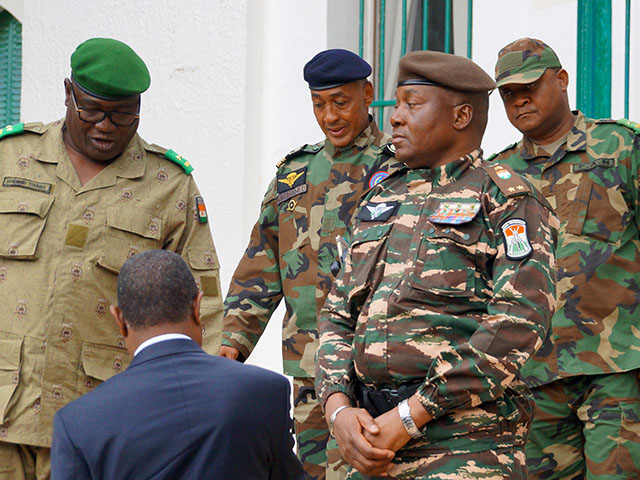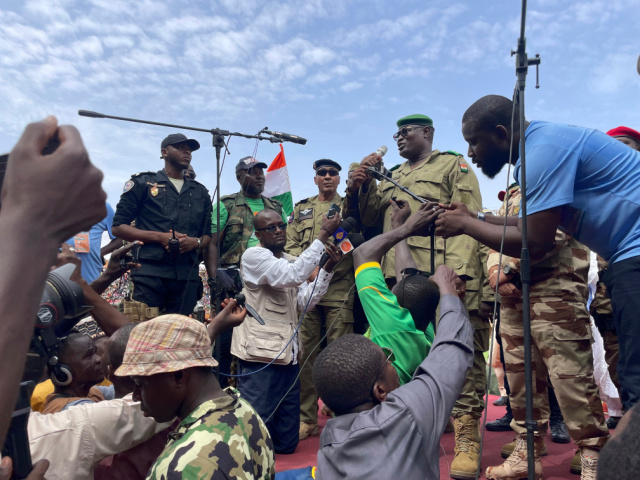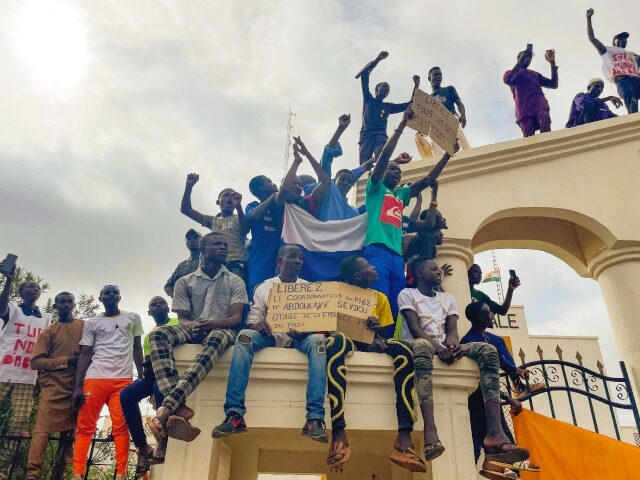The Economic Community of West Africa States (ECOWAS) called an emergency meeting for Thursday this week after the passage of an ultimatum it issued to coup organizers in Niger to restore the democratically elected government or face a potential military invasion.
A group calling itself the “National Council for the Safeguard of the Homeland” appeared on national television in Niger in late July and claimed it had deposed President Mohamed Bazoum, who international observers believe has remained under house arrest in the presidential residence since the coup began. The head of his presidential guard, General Abdourahmane Tchiani, declared himself president, claiming Bazoum had failed to appropriately confront the radical jihadist terror groups threatening the country. The coup d’etat was the third attempt against Bazoum since he took office in 2021 and followed a string of similar military ousters in neighboring countries including Mali, Burkina Faso, and Guinea, among others.
ECOWAS – led by Nigeria, Africa’s largest economy – issued a bold declaration on July 30 that it would not allow the coup organizers to maintain control of the country. Niger is an ECOWAS member nation.
“In the event the Authority’s demands are not met within one week, take all measures necessary to restore constitutional order in the Republic of Niger. Such measures may include the use of force,” the group’s original statement read.
A week came and went with ECOWAS taking no action, as its original statement prompted the military juntas in charge of Mali and Burkina Faso to vow to enter the battlefield should the economic bloc attack. On Monday, the head of ECOWAS, Nigerian Preisdent Bola Tinubu, announced a new round of emergency discussions set for Thursday.

Abdourahmane Tchiani and other army commanders held a meeting in the capital, Niamey, Niger on July 28, 2023. Gen. Abdourahmane Tchiani, the head of Nigerâs presidential guard, declared himself the new leader of the country after a coup. ( Balima Boureima/Anadolu Agency via Getty)
“The ECOWAS Leaders will be considering and discussing the political situation and recent developments in Niger during the Summit,” a statement from Tinubu read, without elaborating.
Radio France Internationale (RFI) reported on Monday that ECOWAS would also send a delegation of diplomats to Niamey, the capital of Niger, alongside United Nations officials to hold talks with the Tchiani group on Tuesday. Prime Minister Ouhoumoudou Mahamadou, who served under Bazoum and the junta attempted to replace on Monday, claimed that the coup plotters had requested that ECOWAS send its delegation to continue discussions.
The Tchiani group – unlike the coup leaders in Burkina Faso and Mali, who rapidly switched alliances away from the West and towards Russia – has shown some willingness to maintain communication with France and America, some of Niger’s most prominent allies under Bazoum. In his speech declaring himself president, Tchiani scolded Bazoum for allegedly squandering “the appreciable and appreciated support of our external partners,” an apparent nod to Paris and Washington.
The “National Council for the Safeguard of the Homeland” welcomed American Acting Deputy Secretary of State Victoria Nuland to Niamey on Monday, giving her over two hours with some of its most senior leaders, though not with Tchiani. According to Nuland, the talks were “workmanlike” but she failed to make any diplomatic progress in them despite the extended amount of time they lasted.
The administration of leftist President Joe Biden evacuated non-emergency personnel from its embassy in Niamey last week, but did not extract its significant troop presence, there as part of an agreement with Bazoum’s government to help combat jihadist terror organizations.

Mohamed Toumba, one of the soldiers who ousted Nigerian President Mohamed Bazoum, addresses supporters of Niger’s ruling junta in Niamey, Niger, Sunday, Aug. 6, 2023. Nigeriens are bracing for a possible military intervention as time’s run out for its new junta leaders to reinstate the country’s ousted president. (AP Photo/Sam Mednick)
“All indications right now that there’s no, you know, imminent threat against any U.S. personnel or American citizens, but again, we continue to encourage American citizens who are in the country to stay in close contact with our embassy there,” Pentagon Press Secretary Air Force Brig. Gen. Pat Ryder told reporters last week.
The potential conversations with ECOWAS on Tuesday are clouded by the ongoing threat of a potential military invasion. ECOWAS leaders have repeatedly claimed that they have a concrete plan on how to invade Niger, resulting in Tchiani’s coalition shutting down national airspace and vowing a forceful response to any such attack.
“All the elements that will go into any eventual intervention have been worked out here, including the resources needed, the how and when we are going to deploy the force,” senior ECOWAS official Abdel-Fatau Musah said on Friday.
The Nigerian newspaper Vanguard reported this week that the plan was the product of a meeting between the chiefs of defense staff of Togo, Sierra Leone, Senegal, Nigeria, Ghana, Liberia, Guinea Bissau, Gambia, Cote d’Ivoire, Cabo Verde, and Benin – though Nigeria is believed to have by far the largest number of troops available for such an intervention.
Complicating matters, particularly for the Nigerian government, is a significant lack of support in the country for any such military action. The Nigerian Senate refused last week to vote in favor of granting Tinubu, who was elected president in March, authority for military action, draining his political capital. Tinubu held a meeting with governors whose states border Niger attempting to galvanize support, as well, but reportedly made little progress.
On Monday, a group of 24 activists, journalists, and experts published a letter in France discouraging military intervention, warning that such a war would “dramatically affect populations whose lives are already very vulnerable” and allow “rebels, militias, [and] traffickers” an opening to take advantage of the chaos and elevate their presence in the country.
“[A]nother war in the Sahel will have only one winner: the jihadist movements that for years have been building their territorial expansion on the failure of states,” the letter, as translated by RFI, read.

COMMENTS
Please let us know if you're having issues with commenting.